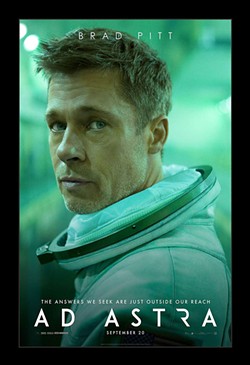Review: Ad Astra
Updated September 21, 2019 at 6:26 p.m.
[
{
"name": "Air - MedRect Combo - Inline Content 1",
"component": "14680855",
"insertPoint": "7",
"requiredCountToDisplay": "5",
"parentWrapperClass": "fdn-ads-inline-content-block"
},{
"name": "Air - MedRect Combo - Inline Content 2",
"component": "14680856",
"insertPoint": "15",
"requiredCountToDisplay": "9",
"parentWrapperClass": "fdn-ads-inline-content-block"
},{
"name": "Air - SVP - Leaderboard - Inline Content - 2",
"component": "16852291",
"insertPoint": "10",
"requiredCountToDisplay": "10",
"parentWrapperClass": "fdn-ads-inline-content-block"
},{
"name": "Air - SVP - Leaderboard - Inline Content - 3",
"component": "16852292",
"insertPoint": "20",
"requiredCountToDisplay": "18",
"parentWrapperClass": "fdn-ads-inline-content-block"
},{
"name": "Air - SVP - Leaderboard - Inline Content - 1",
"component": "16852290",
"insertPoint": "25",
"requiredCountToDisplay": "22",
"parentWrapperClass": "fdn-ads-inline-content-block"
}
]
AD ASTRA
***1/2 (out of four)
If Apocalypse Now airlifted Joseph Conrad’s Heart of Darkness and released it smack in the middle of the Vietnam War, then Ad Astra takes hold of the material and blasts it into outer space.
A cautious and contemplative movie that also dropkicks Tarkovsky and Kubrick into the conversation, Ad Astra (Latin for “to the stars”) is a dazzling slice of science fiction, a movie that moves to its own rhythms without bothering to see if everyone has managed to get into the groove.
It’s a bold piece and unapologetically so, and it ultimately makes the likes of Gravity look like an episode of The Jetsons by comparison.
I jest, of course, but I will allow that Ad Astra surpasses Gravity (and Interstellar, and The Martian) in its depiction of that final frontier known as space. Visually, this is one of the most astounding employments of CGI I’ve yet witnessed in this realm, with starry vistas that are sure to elicit gasps with their you-are-there expansiveness and clarity.
Created by writer-director James Gray (The Lost City of Z) and co-scripter Ethan Gross, the futuristic Ad Astra finds Brad Pitt cast as Major Roy McBride, who followed in the footsteps of his famous father by becoming an astronaut. But Clifford McBride (Tommy Lee Jones) has been missing for well over a decade, seemingly lost to the cosmos along with the other members of a mission known as The Lima Project.
But at the same time that a series of mysterious power surges have been pummeling Earth, the militarized United States Space Command (which employs Roy) is led to believe that not only might Clifford be alive after all these years but that he could have something to do with these surges that threaten to irreparably damage our planet.
Space Command wants Roy to venture into space and locate his father. But all other intel is on a need-to-know basis, and the powers-that-be determine that Roy doesn’t need to know. Still, it isn’t hard to figure out Space Command’s game plan.
If Clifford McBride has indeed gone insane, there are those ready to terminate with extreme prejudice. For his part, Roy just hopes to reconnect with a father figure who had always been distant in more ways than one.
While the movie’s endgame is never very much in question — who doesn’t expect that there will be some sort of communication between pere et fils? — there are plenty of narrative surprises along the way, many played out in episodic fashion. The lawlessness of outer space hearkens back to the Wild West — in this sense, the film brings to mind Peter Hyams’ Outland, the High Noon variation starring Sean Connery.
A mid-movie rescue mission ends in spectacularly gruesome fashion, with a twist few (if any) will see coming. And the particulars of the moon base allow for an involuntary guffaw (let’s just say that American capitalism will conquer space as much as it has already conquered Earth).
Donald Sutherland has a couple of choice scenes as an old colleague of Clifford McBride (interesting casting, since Jones and Sutherland were two of the four Space Cowboys in the Clint Eastwood film from 2000), while Liv Tyler appears throughout (mostly in memory treks) as Roy’s estranged wife. All the performers are capable, but this is clearly Pitt’s film from opening to end.
Pitt’s an interesting actor in that he can tap his movie-star magnetism when the role requires it (as in this summer’s Once Upon a Time in… Hollywood) and submerge it when it would only get in the way.
His work as Roy McBride represents the latter, with the actor playing it close to the vest as a man who has forever lived in the shadow of his own dad, a larger-than-life figure who might have been formidable as a pioneering astronaut but who was pretty lousy as a human being.
In lesser hands, the father-son thread might have seemed insipid in the midst of such visionary sights and reflective musings. But thanks to Gray’s patience and Pitt’s intuitive and heartfelt turn, it’s a worthy hook for Ad Astra.
If Clifford McBride is the movie’s Monolith — mysterious, impenetrable, and lording over the cosmos — then Roy McBride is its Star Child — inquisitive, open-eyed, and ripe for rebirth.
Published September 17, 2019 at 4:00 a.m.


























